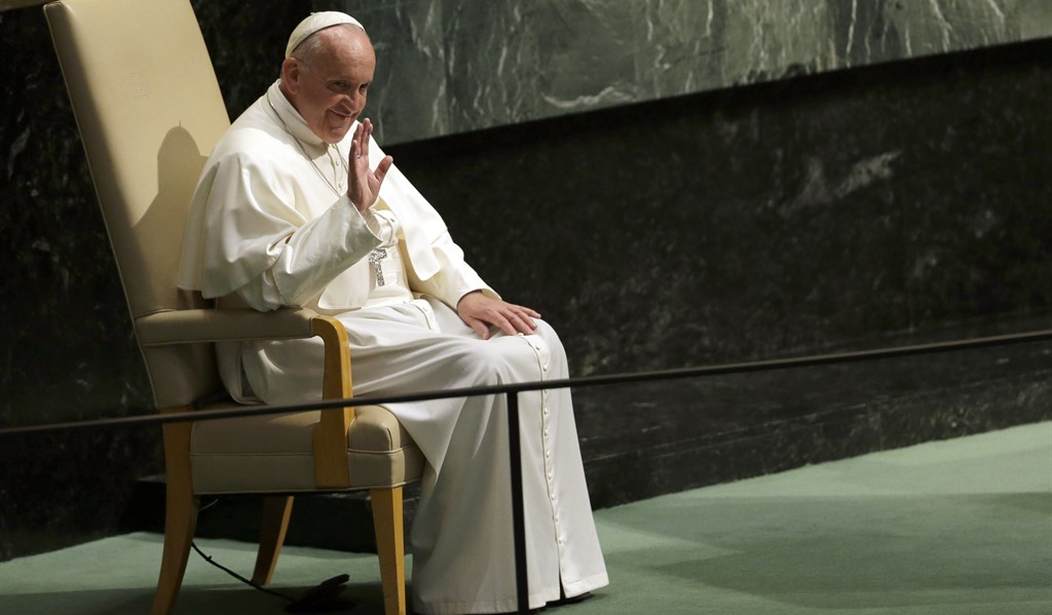The two things you're never supposed to discuss at a dinner party -- politics and religion -- collided like a spectacular supernova this week in Washington and New York as Pope Francis delivered remarks on hot-button political issues like climate change and immigration before numerous political bodies, from the president to the Congress to the United Nations.
And yet, some are oddly and naively insisting that the pope is somehow above politics and those of us who think differently are crassly "politicizing" his otherwise unadulterated messages of hope and love.
This is absurd, and Pope Francis would agree. If anything is clear from his American visit, it's that he doesn't want us to ignore politics; he wants us to bridge politics.
Among the scolded are presumably the White House, politicians on the left and the right, presidential candidates, special interest groups and journalists who leapt at opportunities -- and they were plentiful -- to draw political conclusions from pope's addresses.
Many on the left were ecstatic, albeit selectively, over what they perceived as a rousing endorsement of liberal policies, namely addressing climate change and expanding access for illegal immigrants.
A tweet by MSNBC contributor David Corn is representative:
"This pope far more fixated on social justice (and environmental) protection than abortion/gay rights/dogma. Sorry, conservatives."
And on the right, Republicans (echoed earlier this year by presidential contenders Rick Santorumand Jeb Bush, both Catholic) blasted the pope for wading into issues of scientific scrutiny like climate change. Others tried to remind liberal audiences that poverty and income inequality were not actually liberal issues, just issues that conservatives and liberals disagree on how to solve.
Recommended
Media outlets took great delight in noting when Republicans in Congress refused to stand and cheer for certain of the pope's remarks, while others pointed out the awkward hypocrisy of Catholic Democrats claiming as their own a pope whom they systematically ignore when it comes to abortion and gay marriage.
For all these sins and more, religion writer (and liberal Catholic) Peter Steinfels is demanding our penance.
Lamenting the politicization of the pope's visit, he warned in Politico that "religious teaching is inevitably impoverished when it is reduced to political slogans."
In a twist on this argument, Daniel Henninger in the Wall Street Journal discounts the idea that a pope who meets with President Obama explicitly to praise his climate change and Cuba initiatives can be anything but politicized. "Everyone in politics is one of the boys," he writes, "including the pope."
But Henninger thinks this is a bad thing. "How allowing the papacy's core moral authority to be politicized is in the in the interests of the Catholic Church as an institution is difficult to see."
These two framings of the pope's visit -- the pope is above our petty politics, and politicizing him is bad for the church -- seem wholly disconnected from Francis's papal priorities.
There's a reason Francis, who routinely urges his audiences to go out and "make a mess," delivered his speeches to political leaders at the White House, in Congress and at the UN. There are deep divides among these groups about how to solve global and domestic problems, and stoking conversation -- even and perhaps especially if controversial -- is crucial for progress.
Powerful conversations are happening in both secular and religious corners around the country exactly because the pope has engaged on issues of American political import and Americans have responded in kind.
The Vatican has clearly signaled its willingness to engage on politics. In an extraordinary example of this papacy's assertiveness, a papal adviser called directly on Bush and Santorum to listen to the pope on climate change: "We talk about these subject matters not because we are experts on those matters; we talk about them because they concern the impact on our lives."
This is a good thing. A healthy, vibrant Catholic Church is one that is relevant and connected to its laity. Just contrast Francis with his predecessor. Pope Benedict's opposition to the Iraq war was well-known, but he chose not to mention it publicly during his 2008 visit to the U.S., preferring to privately discuss it with President Bush. One wonders the impact on Catholics and supporters of the war had that conversation instead been a communal one instead of a polite one.
Steinfels and others might want to separate the pope from politics, but that doesn't seem to be Francis' plan. And whether you're Catholic or not, Republican or Democrat, we should all take up an influential religious leader on his offer to "make a mess."

























Join the conversation as a VIP Member